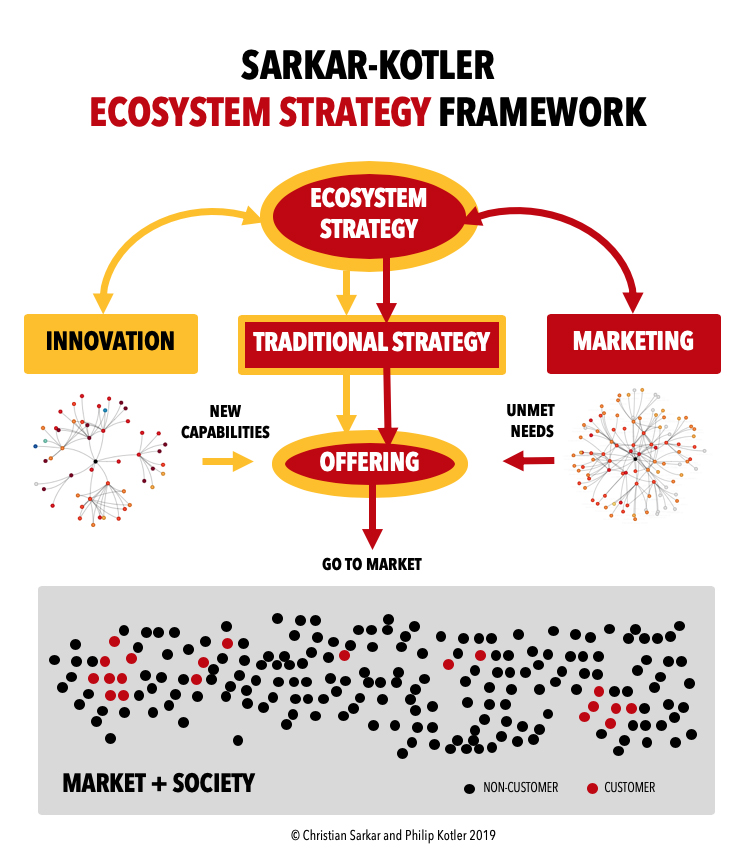1. Innovation and Marketing
Philip Kotler and Shigetaka Komari, Never Stop – Winning Through Innovation, Kotler Impact (Story of Fujifilm) 2020.
· What’s the worst situation that a co. can face—losing its whole market. Think of Kodak. Kodak is dead. Think of Fujifilm.
Fujifilm is alive and well. But Fujifilm lost its whole film market.
· But Komori was the Chairman. He realizes hidden treasures. Try to make color film. 15 steps. F didn’t have time to turn its other technologies into winners. Komori was a believer in Peter Drucker’s two basic functions. Innovation and marketing. He had studied both. Today Fuji has several innovation labs. It has introduced many new projects. No one quit on him. They had such confidence in him. Komori asked me to study the firm’s responses to the lost of Fuji’s market and coauthor a book, where he puts in the innovations and I describe the marketing. We call the book Never Stop Marketing.
2. Branding
Christian Sarkar and Philip Kotler, Brand Activism: From Purpose to Action, Houston, TX, Idea Bite Press, 2018.
· A brand normally simply assigns a name to a product and its variants that describes the features, price, and where to get it.
· There is a lot of work to choosing the brand’s name, testing it, copyrighting it, protecting it.
· But today a great brand goes beyond these functions. An active brand is an activist brand. A brand should take stands. It must show that it stands for a caring company, carrying for its employees, suppliers, distributors. It shows that it cares about the environment and sustainability. Usually it carries one or more significant stories (Aaker) such as Panasonic against waste.
· Unilever has a few hundred brands run by a brand leader. The brand leader must define the purpose of the brand, the higher purpose. Dove is not just a soap or skin care product. It is about beauty and every women is beautiful. Ben and Jerry’s ice cream is not only to make a profit but also to delight people with its flavors and to support Vermont farmers who need help
3. New Developments in Marketing
Philip Kotler, Hermawan Kartajaya, and Iwan Setiawan, Marketing 5.0 Wiley (2021).
· My latest book, 5.0. But was there a 1.0, 2.0, 3.0, 4.0? Yes. The first book was 3.0 in which we described what a 1.0 vs. a 2.0 vs a 3.0 would be……
· In 5.0 we describe the major generations, from the book generation to the millennials to the generation z. Each generation grew up with different music, different major events. You need to know that generation’s history if you want to sell to them.
· Another way to look at it is four life stages: 1-20 studying 20-40 starting a career 40-60 having a family and maturing in a career, and 60-80 retirement. Talk about living to 100.
· The book also talk about new technologies: AI, Algorithms, Virtual Reality, neuroscience,
4. Human-oriented marketing
Philip Kotler, Waldemar Pfoertsch, and Uwe Sponholz, H2H Marketing: The Genesis of Human-to-Human Marketing (2021).
· Human to human. People to people.
· The book is spelling out the main tenets of marketing along with three new areas:
· Design thinking
· Digitalization
· Service dominant logic
5. Social Media Marketing
Svend Hollensen, Philip Kotler, and Marc Oliver Opresnik, Social Media Marketing: A Practitioner’s Guide, 4th ed., Amazon Direct Publishing, 2020.
· Social media platforms such as Facebook, Google, Instagram, Pinterest, and other have become so important not only in connection people to each other but as advertising and payment media.
· Facebook fell apart for 5 hours a few days ago and so many businesses were hurt in not being able to operate. This book explains the different social media platforms and how they work and how actual companies use them
· P&G story of overspending to learn how each platform worked and which deserves use.
6. The Common Good
Philip Kotler, Advancing the Common Good: Strategies for Business, Governments, and NonProfits, Praeger, 2019.
· When you make decisions, you want to make the best decision. Normally, you take the decision which maximizes the good of the owner, or the company, or the community.
· In 1780s, not only did Adam Smith write the wealth of nations but also Thomas Hobbes was developing the theory of the Common Good. He uses the pleasure principle. Any decision will make some people happy and others unhappy (plus indifferent). A decision is good if it makes more people happy than unhappy. That decision increases the common good. If two decisions both will do this, chose the one which increases the common good by the number of net happy persons.
· I apply this reasoning to decisions made by businesses, governments and nonprofit organizations.
7. Health Care Marketing
Philip Kotler, Robert Stevens, and Joel Shalowitz, Strategic Marketing for Health Care Organization, 2021.
· The health care industries is one of the most important ones in the world. I wrote this book with 2 other health scientists to describe the American health system. Many of you might think America has the best health care system. We don’t. It is a very expensive health system that costs us 18% of the GDP. France, Germany, Italy spends only 12% on its health systems and they deliver great care at less cost.
· You can judge a health system too by how healthy people are in the population. All the Nordic countries are always in the top 10 of healthy countries. The U.S. is 16.
· The U.S. system delivers quality care but at high cost and lower coverage.






